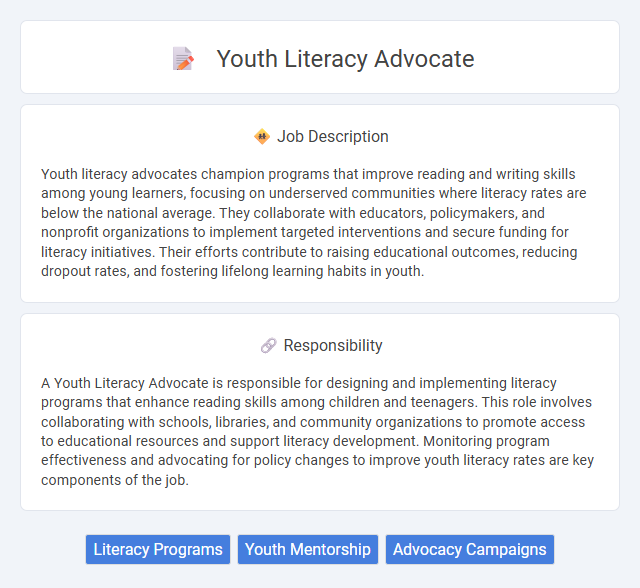
Youth literacy advocates champion programs that improve reading and writing skills among young learners, focusing on underserved communities where literacy rates are below the national average. They collaborate with educators, policymakers, and nonprofit organizations to implement targeted interventions and secure funding for literacy initiatives. Their efforts contribute to raising educational outcomes, reducing dropout rates, and fostering lifelong learning habits in youth.
Individuals passionate about empowering young people and improving community education levels may find the role of Youth Literacy Advocate particularly suitable. Those with strong communication skills and a commitment to social equity are likely to thrive in this position. Candidates who are patient, empathetic, and adaptable may have a higher probability of successfully motivating youth and addressing literacy challenges.
Qualification
A Youth Literacy Advocate typically requires a bachelor's degree in education, social work, or a related field, combined with experience in youth engagement and literacy programs. Strong communication skills and the ability to design and implement literacy initiatives tailored to diverse youth populations are essential qualifications. Proficiency in data analysis and community outreach further enhances the effectiveness of literacy advocacy efforts.
Responsibility
A Youth Literacy Advocate is responsible for designing and implementing literacy programs that enhance reading skills among children and teenagers. This role involves collaborating with schools, libraries, and community organizations to promote access to educational resources and support literacy development. Monitoring program effectiveness and advocating for policy changes to improve youth literacy rates are key components of the job.
Benefit
Youth Literacy Advocate positions likely offer significant benefits such as the opportunity to empower young individuals through improved reading and writing skills, which may enhance their academic performance and future career prospects. Engagement in this role probably fosters a strong sense of community impact and personal fulfillment by addressing educational disparities. Employers might also provide professional development and networking opportunities, increasing the advocate's expertise and influence in literacy education.
Challenge
Youth Literacy Advocate roles likely involve overcoming challenges related to limited access to educational resources and varying literacy levels among different communities. There may be frequent obstacles in engaging reluctant readers or addressing socio-economic barriers that impede learning opportunities. Success in this position probably depends on developing innovative strategies to motivate youth and collaborate with schools and local organizations.
Career Advancement
Youth Literacy Advocate roles offer significant opportunities for career advancement within educational nonprofits, government agencies, and community organizations. Professionals in this field develop expertise in program development, grant writing, and community engagement, positioning themselves for leadership roles such as Literacy Program Director or Education Coordinator. Building a strong network and demonstrating measurable impact on youth literacy rates further enhances prospects for career growth and influence.
Key Terms
Literacy Programs
Youth Literacy Advocates design and implement comprehensive literacy programs that improve reading and writing skills among young learners. They collaborate with schools, community organizations, and libraries to provide targeted support, including workshops, tutoring sessions, and resource distribution. Tracking progress through assessments and adapting strategies ensures measurable improvements in youth literacy rates.
Youth Mentorship
Youth Literacy Advocates play a pivotal role in promoting reading and writing skills among young people through targeted mentorship programs. They design and implement tailored literacy activities that address individual learning needs, fostering critical thinking and communication abilities. By building trusting relationships, these advocates empower youth to overcome educational challenges and develop lifelong literacy habits essential for academic and personal success.
Advocacy Campaigns
Youth literacy advocates design and implement targeted advocacy campaigns that promote reading and writing skills among young people. These campaigns utilize data-driven strategies to engage communities, policymakers, and educators, aiming to increase access to educational resources and literacy programs. Effective youth literacy advocacy drives policy changes and funding allocations that support equitable learning opportunities nationwide.
 kuljobs.com
kuljobs.com